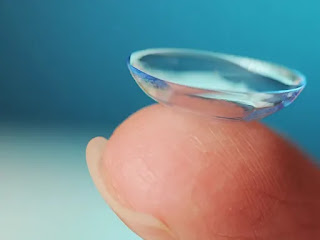My contacts are poisonous? Not so fast.
Recent media coverage has brought attention to a report claiming that 18 soft contact lenses from three major companies in the industry were found to contain PFAS or toxic "forever chemicals". Per- and polyfluoroalkyl substances (PFAS) are a class of synthetic chemicals used in a variety of consumer products for their ability to resist heat, stains, and water. They are referred to as "forever chemicals" because they break down very slowly and can accumulate in people, animals, and the environment over time. This has prompted concern about potential long-term health effects - studies have shown that high levels of exposure to some PFAS may be linked to increased risk of cancer and other adverse health issues.
In contact lenses, PFAS are used to soften the material and enhance oxygen permeability. So, you might be wondering, are my soft contact lenses safe to be wearing?
Currently, there is no scientific literature published to show harmful effects directly relating to PFAS in contact lenses or that the eyes actually absorb PFAS from contact lenses. Claims that PFAS found in contact lenses are present in harmful amounts has not been verified, and there are questions regarding the study that was cited (i.e., study design, the organization who published the study, control groups, etc.). It is also worth mentioning that the type of PFAS used in contact lenses are fluoropolymers, a less mobile type. Ultimately, the CDC states "more research is necessary to assess the human health effects of exposure to PFAS."
So, what do we know? Don't eat your contacts ;)
Alcon has stated their Dailies Total 1 and Total 30 lenses do not contain organic fluorine in their formulation; Johnson & Johnson (formerly Vistakon) also states they do not use PFAS in their soft contact lenses; Bausch + Lomb, who was not included in the study, has also released a statement saying none of their soft contact lenses are formulated with PFAS.
If you have any concerns about your current contact lens usage, don't hesitate to reach out to your eye care provider. We are always happy to help you make informed decisions.
Dr. Rachel

It's understandable to be concerned about the potential risks of PFAS in contact lenses. However, with no direct evidence linking PFAS exposure from lenses to harmful health effects and further research needed, it's important to stay informed. Hopefully, more studies will clarify any potential risks and offer reassurance.
ReplyDelete